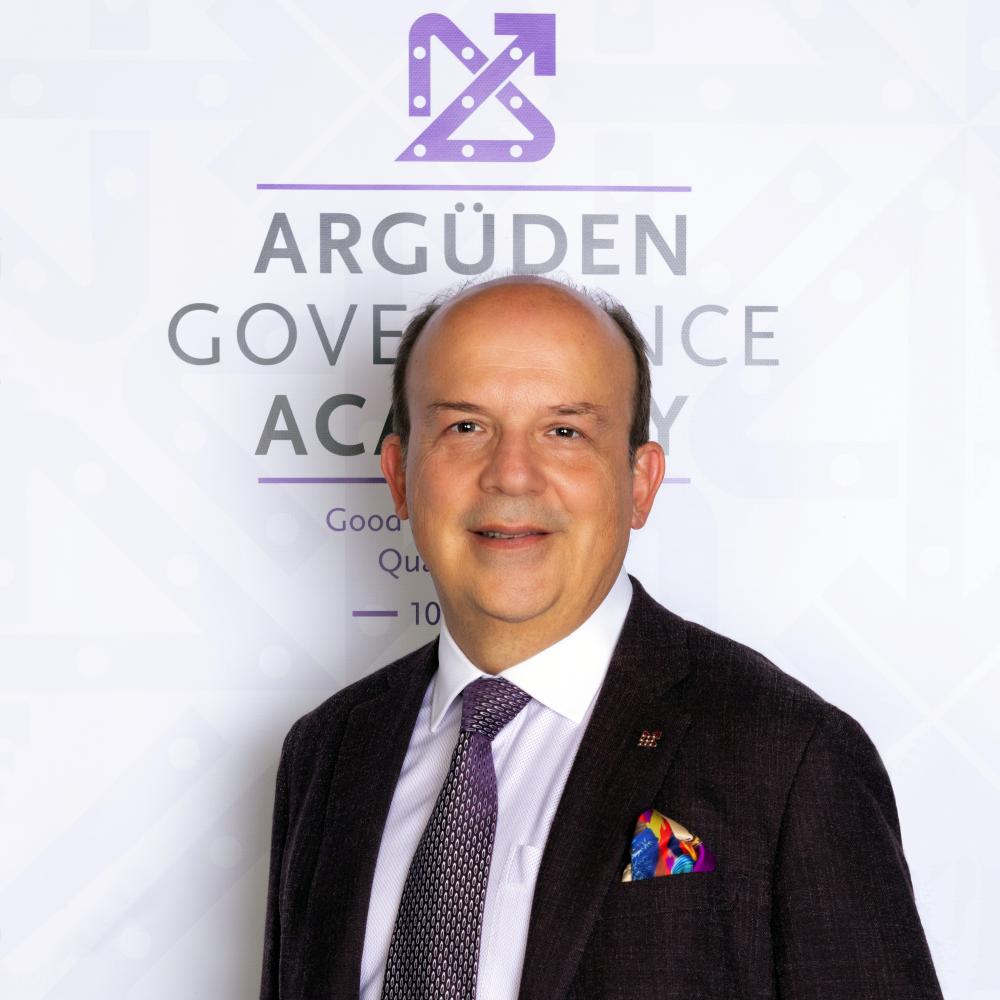The leaders who embrace an “infinite” mindset in the infinite game of life – as explained by the author - are much more likely to build sounder and more inspiring organizations. Leaders with an 'infinite" attitude spend their time focusing on building long-term relationships and trust, rather than executing a short-term plan. They don't hold information to themselves but share it. They are not afraid of uncertainty, which is why they have a long term planning horizons. Leaders with a "finite" mentality tend to focus on the short term because it involves much less uncertainty. At the same time, while "finite" leaders get into competition with players in their own field, leaders with an "infinite" mindset choose to compete with themselves for their own "existential survival".
The same mindset holds true not only for leaders but also for countries. In some countries, leaders, institutions, corporations make an honest effort to engage each other with the very same “infinite mindset” described by Sinek. They may explore and contemplate early on the threats of climate change, poverty, inequality, and discrimination. In doing so, they may take the right precautions in a timelier manner compared to others, and kick start the process of tackling the challenges. This holds true especially when several actors in those countries do their part simultaneously—when conscious citizens push for change, responsible regulatory institutions act upon those public expectations in the form of guidance and regulations.
This mindset becomes also obvious when the leaders of those countries wish to leave the world in better shape than they found it. As a consequence of their leaders’ inclusive thinking, flexibility’ and endurance those countries are less likely to be left behind in an ever-changing world.
The “infinite mindset” can also be seen in the study of Environmental, Social and Governance (ESG) disclosure. In particular, two emerging market countries, South Africa and Thailand, whose stock markets, (Stock Exchange of Thailand and Johannesburg Stock Exchange respectively), made it into the "Top Ten" list for best ESG disclosure in 2018, according to a study conducted by SSE (Sustainable Stock Exchanges). The analysis includes 35 global exchanges with more than 4,300 companies listed and it provides a snapshot of disclosure practices for seven sustainability-related indicators. SET and JSE were respectively at 7th and 8th in the ranking. This finding was validated by the analysis of Corporate Knights, in which both the South African and Thai markets ranked 9th and 10th respectively.1
Additionally, similar results appeared also in an impact-research study conducted by Argüden Governance Academy called the Sustainability Governance Scorecard©. The comparative review, which covers ESG-compliant companies in 7 countries across 10 sectors, evaluated and ranked South Africa in second place, after the United Kingdom, but higher than the United States, Germany, Türkiye, India, and China. The study, which analyzes the transparency of reporting with governance lenses, also shows that the majority of corporations listed at the JSE have made it to the top 2 Tiers out of a total of 5 Tiers.2
Given the multiple sources of favorable South African and Thai governance coverage, an analysis of what was done by the respective actors is warranted. At the onset of the analysis is the question of whether the notion of “legacy” and “infinite mindset” was considered in the policies encouraging superior ESG disclosure. Other questions include: Did they have an early start with their sustainability efforts? Did they receive better guidance and more engagement from regulatory authorities and stock exchanges? Did they have extraordinary expert leadership on issues such as corporate governance and sustainability guiding key institutions? Or did both countries simply need to work hard to attract foreign capital so regulators were incentivized to be cutting edge—particularly for Thailand after the Asian Crisis and South Africa after years of persistent deficits during the Apartheid years.
In the case of South Africa, early progress in the area of governance reporting may have partially been the need to atone for Apartheid. With the onset of the Mandela administration, it was decided by the South African government that a socio-economic transformation program was needed to address the imbalances from the past. This program was started with a transfer of ownership, management, and control of South Africa’s financial and economic resources to the majority of South African citizens. The Black Economic Empowerment program (BEE) was first implemented in 2003 and then was expanded to a more inclusive modified version called broad-based Black Economic Empowerment (B-BEE) in 2007. This program had many implications for capital markets, equity ownership as well as achieving diversity both at the board and workforce level through measures such as employment preference, skills development programs, preferential procurement, etc.
In order for the government to assess the corporations’ BEE status and progress achieved towards BEE goals, it developed a scorecard. As part of BEE, corporations had to declare a 5-year plan and report progress on it. It was compulsory, (with significant fines in case of non-compliance); therefore it forced the majority of corporations to transform. The publicly listed corporations have also included this scorecard in their annual integrated reporting because it evaluates elements such as ownership, human resource development, supply chain, and CSR investments. This means the work done for BEE became an early reference framework in South Africa to integrate with subsequent trends in governance, sustainability, etc. Having taken place in 2003, it was a full 15 years earlier than what was done in other emerging markets.
Prior to BEE being implemented, there was another key initiative introduced in South Africa in 1994—the first corporate governance code, which was named the King report. This was a direct consequence of retired Supreme Court Judge Mervyn King being asked by the Institute of Directors of South Africa (IODSA) to chairing a committee on corporate governance. Mr. King was an astonishing practitioner and academic with a formidable background in law. He wanted to drive change in behavior. The King Committee - perhaps in an "infinite” mindset - established this governance code, which did not only refer to financial aspects but also stood for an integrated approach involving stakeholders other than shareholders.
In examining the efficacy of the King Code, one notes that the rule of “Comply OR Explain” (within version King Code 1) began driving change in corporate behavior. The amount of change was even more telling by version 4 when the rule was modified to “Apply AND Explain”. It is important to note that the framework, established by Mr King and the King Committee, allowed for corporate flexibility. By continuously refining the code in various versions, Mr. King and the King Comittee ensured that corporations could be aware of the most recent risks and opportunities. Most importantly, Mr. King did not do this because he was following or replicating any actions conducted by peers. In fact, there were not many other examples at the time. In an “infinite” mindset, he has foreseen this as a necessity for the existential flexibility and future strength of South African corporations.
Thailand was also an early starter. According to research conducted by the Sustainable Stock Exchanges initiative in 2001, the Stock Exchange of Thailand was the only exchange reporting and publishing its own data on sustainability. By 2010, it had been joined by 13 other exchanges. This number went up to 39 in 2018; 17 years after SET first started the routine.
In terms of promoting sustainability and transparency in their markets, stock exchanges and regulatory agencies have the ability to foster meaningful change in their respective regions as they have purview over the market participants… Initiatives include giving advice to market participants, providing research, organizing sustainability training or putting together gender equality or green finance related activities. Both SET and JSE have been using this unique authority to be impactful within their individual markets.
SET, for example, did a series of sustainability workshops every year as part of its Sustainable Development Forum and additional meetings with listed companies as well as investors to discuss the specifics of sustainability reporting. What is important is that these types of initiatives are not one-time events’ but they are continuous and repetitive which is the reason for their high impact. In an "infinite" mindset, SET conducts this effort all year around and demonstrates its inclusive approach when engaging its stakeholders both with listed corporations and the investment community. At some other global exchanges, an educational event may be picked up only now and then with no particular influence.
Likewise, JSE organizes an event on a regular basis called the ESG Investor Showcase, which is an event to allow issuers to communicate and display what they have been doing in the ESG space, and to facilitate dialogue between issuers and investors. In this case, it is to encourage and endorse investor-issuer communication and to enhance the dialogue about sustainability data and reporting methods.
Stock markets can have an essential influence over corporations because they can pool resources, which is their advantage and consequently they can enforc common standards. For example, some exchanges can enforce standards in reporting and include publishing certain non-financial data as a prerequisite for all corporations, which are listed at their exchange.
In South Africa's case, such a regulatory influence on capital markets came very early. According to research conducted by Sustainable Stock Exchanges initiatives, requiring ESG reporting for their listed companies was first initiated in 2002 when Euronext France and the Johannesburg Stock Exchange paved the way to adopt this practice. In South Africa, listing requirements changed to enforce companies to comply with the various iterations of the King Code. In King III, integrated reporting was introduced and recommended as best practice, thus indirectly causing companies to adopt integrated reporting (comply) or explain why they had not adhered to the recommendation. By 2010, Borsa de Valores de Colombia was the only other stock exchange that had introduced mandatory sustainability reporting. However, by the third quarter of 2018, the number of stock exchanges with mandatory ESG reporting increased to 16.3
Thailand did not start as early as South Africa in compulsory regulation, but it published its Guidelines for Sustainability Reporting early in 2010. Later by 2014, Thailand’s Securities and Exchange Commission (SEC) was already requiring social responsibility reporting and mandatory disclosure requirements. Most recently, Thailand published two new codes in 2017 with fairly positive reception from market participants according to a report by CLSA called "CG Watch 2018: Hard decisions". The first one is the 2017 version of the Corporate Governance Code. It has been substantially modified from the preceding code and is based on the primary question of how boards should conduct their affairs. There is a divergence from the previous structure, while still remaining in line with OECD’s five principles. Improvements in the code include innovation as a new aspect and sustainability is highlighted as a major responsibility of the board members. The second newly introduced code, the Investment Governance Code sets out stewardship responsibilities for institutional investors in the Thai market.4
Finally, in a world, where ESG is becoming more common and mainstream, Emerging Markets should not wait for developed countries to take the lead. By being early, they should ensure the future attractiveness of their markets for investors and other stakeholders.
This paper is based on Argüden Governance Academy’s publication: Sustainability Governance Scorecard (2019), Dr. Y. Argüden, Dr. F. Öğücü Şen, G. Argüden, K. Koldemir, P. Ilgaz, Dr. E. Erimez, Ç. Karanberk
References
[1] https://www.corporateknights.com/reports/2018-world-stock-exchanges/helsinki-leads-ranking-worlds-stock-exchanges-sustainability-disclosure-15414364/
[2] https://sgscorecard.argudenacademy.org/overall-evaluation
[3] https://sseinitiative.org/wp-content/uploads/2018/10/SSE_On_Progress_Report_FINAL.pdf
[4] https://www.acga-asia.org/cgwatch.php
Authors















